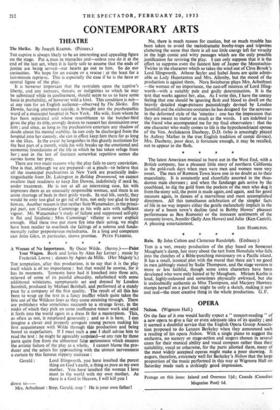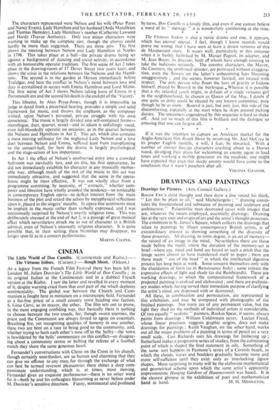OPERA
Nelson. (Wigmore ON the face of it one would hardly expect a" concert-reading " of a new opera to give a fair or even adequate idea Of its quality ; and it seemed a doubtful service that the English Opera Group Associa- tion proposed to do Lennox Berkeley when they announced such a reading of his opera Nelson. With a single piano to suggest the orchestra, no scenery or stage-action and singers chosen in several cases for their musical ability and vocal compass rather than their suitability, vocal or otherwise, for the parts allotted them, many of the most widely accepted operas might make a poor showing. It augurs, therefore, extremely well for Berkeley's Nelson that the large proportion of the music performed in this way at Wigmore Hall on Saturday made such a strikingly good impression. The characters represented were Nelson and his wife (Peter Pares ' and Nancy Evans), lady Hamilton and her husband (Arcla Mandikian and Thomas Hemsley), Lady Hamilton's mother (Catherine Lawson) and Hardy (Trevor Anthony). Only two minor characters were wanting to make up the complete cast, though the chorus could hardly be more than suggested. There are three acts. The first shows the meeting between Nelson and Lady Hamilton at Naples in 1798. This takes place at a ball—the private drama being set against a background of dancing and social activity, in accordance with an honourable operatic tradition. The first scene of Act 2 takes place in the drawing-room of 17 Dover Street two years later, and shows the crisis in the relations between the Nelsons and the Haunt- tons. The second is in the garden at Merton immediately before Trafalgar, and here the conflict in Nelson's mind between love and duty is crystallised in scenes with Emma Hamilton and Lord Minto. The first scene of Act 3 shows Nelson taking leave of Emma in a Portsmouth inn and the second his death in the cockpit of the ' Victory.'
This libretto, by Alan Pryce-Jones, though it is impossible to judge in detail from a piecemeal hearing, provides a simple and solid framework for music, and throws the emphasis, as the composer wished, upon Nelson's personal, private struggle with his own conscience. The music is largely divided into self-contained forms— monologue, duet, quartet, sextet—and its idiom is unfailingly vocal, even full-bloodedly operatic on occasion, as in the quartet between the Nelsons and Hamiltons in Act 2. This act, which also contains a most moving sogloquy for the neglected Lady Nelson and a love duet between Nelson and Emma, suffered least from transplanting to the concert-hall, for here the drama is largely psychological and the stage-action of less importance.
In Act 1 the effect of Nelson's unobserved entry into a crowded ballroom was inevitably lost, and on this, his first appearance, he did not immediately establish his character in any musically memor- able way, although much of the rest of the music in this act was immediately attractive, and suggested that the scene in the opera- house might be most effective. It was not wholly clear from a programme consisting, by necessity, of " extracts," whether com- poser and librettist have wholly avoided the tendency—so noticeable in contemporary English opera—to deflect interest from the main business of the plot and retard the action by metaphysical reflections upon it, placed in the singers' mouths. In opera fine sentiments must be implicit in the music rather than verbally expressed, and I was occasionally surprised by Nelson's overtly religious tone. This was deliberately stressed at the end of Act 2, in a passage of great musical effect which nevertheless struck me as out of character in a. British admiral, even of Nelson's unusually religious character. It is quite possible that, in their setting, these blemishes may disappear, no longer spot-lit as in a concert performance.
MARTIN COOPER.



































 Previous page
Previous page